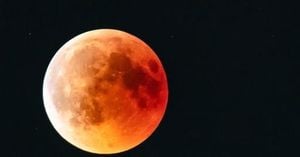Washington, DC – Demonstrators gathered outside the White House to voice their strong opposition to President Donald Trump's recent remarks advocating for the eviction of Palestinians from the Gaza Strip. Protesters declared, “Palestine is not for sale,” as Trump suggested the United States should "take over Gaza" after potentially displacing its residents, framing it as a solution to what he described as the region's issues.
During the evening rally, which took place on Tuesday, hundreds voiced their concerns over Trump's ethnic cleansing proposal and the continued support of his administration for Israel. Protesters maintained their stance against using taxpayer dollars to fund military actions against Palestinians, with some signs reading, “Pay for housing, not genocide.”
According to Al Jazeera, Michael Schirtzer, one of the activists present, vehemently opposed Trump's comments, stating, "The people of Palestine will be going nowhere. They are the Indigenous people of the land.” His remarks captured the sentiment among many who feel Trump's remarks reflect colonial attitudes toward Palestinian land.
Prior to the protest, Trump reiterated his belief during a news conference with Israeli Prime Minister Benjamin Netanyahu, saying Palestinians “would love” to leave Gaza if offered the opportunity, reflecting the controversial opinion he shared earlier about depopulating the region. Human rights advocates have rebuked Trump's comments, closely associATING them with calls for ethnic cleansing, which was met with swift backlash from Arab nations and rights organizations.
Sofia Ahmad, another demonstrator, described Trump as “a fascist, a psychopath, a narcissist” and stressed the importance of protesting against such ideologies. This sentiment echoed among attendees who assembled not only to confront Trump’s comments but also to criticize Netanyahu’s invitation to Washington, DC. Protesters projected wanted posters of Netanyahu onto buildings, labeling him as “a war criminal” sought for justice.
Protest organizers included members of the Palestinian Youth Movement, who expressed outrage over what they deemed welcoming figures responsible for the humanitarian crisis facing Palestinians. Mohammad Qasim, one of the group’s organizers, firmly stated, “There’s no way Trump can succeed in forcing Palestinians out of Gaza. We’ve seen the resolve and the steadfastness and the love of the land.” These assertions underline the unwavering Palestinian identity and attachment to their homeland, even amid oppressive pressures.
Earlier on the same day as the protest, Palestinian rights supporters held a press conference and leveled their critique against what they viewed as the Trump administration’s complicity with Netanyahu. Osama Abuirshaid, executive director of American Muslims for Palestine, remarked, “Trump should not allow Netanyahu to manipulate him,” urging the U.S. President to reconsider U.S.-Israel relations' dynamics.
Responses varied at this gathering, with influential voices like Medea Benjamin of Code Pink emphasizing the significance of international law and justice, stating, “Netanyahu does not belong on the streets of Washington, DC. He belongs in The Hague.” Benjamin's call for accountability reverberated through the crowd, emphasizing the need for leadership to prioritize human dignity over political maneuvers.
Advocates at the protest articulated the desire for peace based on justice, as many named the humanitarian crises afflicting Gaza and voiced concerns over the negative impacts of displacement proposals. Nihad Awad, executive director of the Council on American-Islamic Relations (CAIR), cautioned against viewing Trump’s ideologies as isolated remarks, asserting, “Gaza belongs to the Palestinian people, not the United States.”
The backlash to Trump’s statements reached far beyond the façade of diplomatic relations; it underlined the raw emotions and historical legacies of displacement, suffering, and resistance endured by the Palestinian people. The current scenario reveals the added layer of complexity amid calls for justice and accountability, particularly highlighting perceptions of Gaza and its residents.
Many protesters noted the enduring consequences of foreign policies perceived as dismissive of Palestinian rights and self-determination. Across the board, the phrase “Free Palestine” echoed through the crowd, demanding recognition of the injustices victims face due to geopolitical decisions.
Events at the protest painted clear pictures: the emotional weight of Palestinians' historical struggles fuels their resilience against perceived threats from those holding power. The call by activists for international support and human rights advocacy remains as pressing as ever, especially as ideas surrounding the future of Gaza are construed through rhetoric steeped in removal and ownership.
Despite the gravity of the situation and the uncertainties surrounding Gaza's future, the spirit of the protesters encapsulated determination and hope. “If Donald Trump thinks our people will capitulate and leave their land, he is sorely mistaken,” declared Qasim, underlining the deeply-rooted connection Palestinians have with their land.
This protest was not merely about resisting Trump's remarks; it represented broader struggles aligned with the rights of the Palestinian people and against systemic injustices. The rally encapsulated not just dissent against U.S. foreign policy but also the unyielding will of those who have survived traumas far beyond singular political events. The collective stands signify more than opposition—they symbolize solidarity and the relentless pursuit of dignity, justice, and peace.



